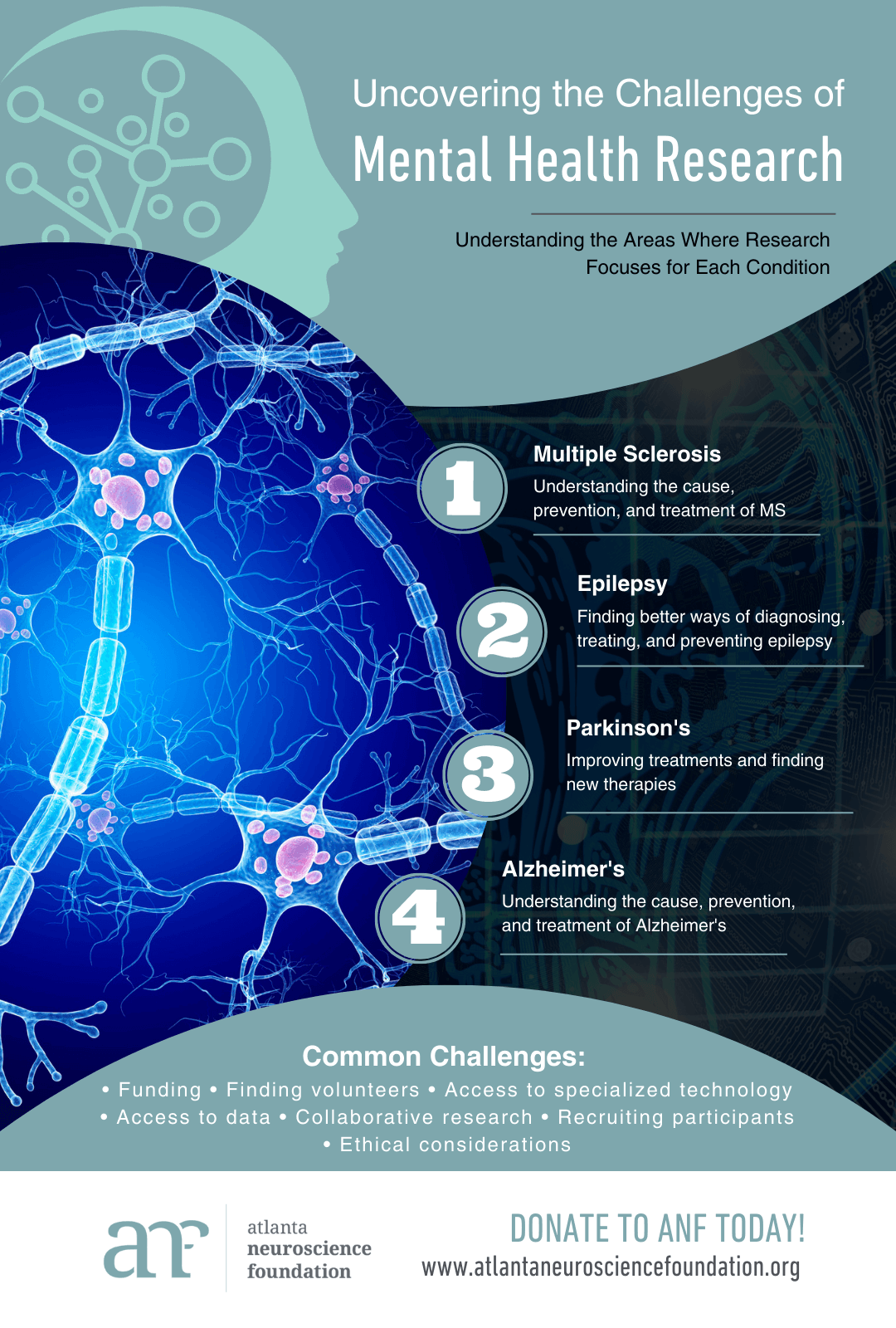Click Here To Donate To Our Cause Today!
Exploring the Medical Research Necessities & Benefits of Neurological Conditions
At Atlanta Neuroscience Foundation, we are dedicated to advancing medical research and providing affordable and comprehensive neurological care to patients. It is essential that we continue to invest in medical research for neurological diseases, as these conditions are often degenerative and can have an immense impact on patients and their families. Research can provide invaluable information about the best ways to manage and treat these conditions, ensuring that patients receive the most effective care. We believe that research is a key component of finding treatments and cures for these conditions, and we strive to support medical research on a continual basis.
Reach out to our team at Atlanta Neuroscience Foundation to learn more about how to donate and what your contributions are used for, and keep reading as we discuss four specific neurological disorders and how your investment in funding is impacting our fight against these conditions.


Harnessing Hope for Multiple Sclerosis
Investment in medical research is essential for the advancement of treatments and potential cures for neurological diseases such as multiple sclerosis. This research is vital in deepening our comprehension of the causes and progression of these conditions, allowing us to develop more effective treatments and therapies. Furthermore, research can provide invaluable information on the most effective ways of managing and treating multiple sclerosis, ensuring that those affected receive the highest quality of care. Research can help us learn more about the causes and progression of these conditions, allowing us to develop new treatments and potentially even cures.
Through your continued support of medical research, we can make great progress in improving the lives of patients with multiple sclerosis.

Medical Research for Epilepsy Patients and Families
Funding for medical research pertaining to people suffering from epilepsy and their families is essential for improving the quality of life for those living with the condition. Research provides a better understanding of the causes and effects of the disorder, as well as developing new treatments and strategies for managing symptoms. Studies have shown that medical research for epilepsy can lead to better seizure control, improved social functioning, and better overall quality of life. Additionally, new treatments and therapies can help reduce the economic burden of living with the disorder, helping to reduce the financial strain on individuals and families. Research can also help to identify and reduce the risk factors associated with the disorder, leading to increased prevention and early detection.
Ultimately, investing in medical research for epilepsy is essential for improving the lives of those living with the disorder and their families.

Improving the Quality of Life for Those Living with Parkinson's and Movement Disorders
Investment in medical research for Parkinson's and Movement Disorders can vastly improve access to treatments and therapies and remove the associated stigma. Such financial support would also allow for the development of novel treatments such as gene therapy and deep brain stimulation, increasing the understanding of the disorder and, thus, improving the quality of life of those affected. In addition, increased awareness of Parkinson's and Movement Disorders can lead to more support for those living with the condition, further contributing to their well-being.
Research funding for Parkinson's and Movement Disorders can drastically improve the outcomes for those affected.

Unlocking the Mysteries of Alzheimer's
Medical research is essential for understanding and finding effective treatments for Alzheimer's. Research is being conducted on various topics related to Alzheimer's, including its causes, risk factors, symptoms, and potential treatments. Medical research currently focuses on therapies to slow the progression of the disease, as well as the development of new medications and treatments. Additionally, research is being conducted on lifestyle factors that may contribute to the development and progression of Alzheimer's, such as diet, exercise, and stress levels. The importance of medical research for Alzheimer's cannot be overstated.
Through research, we can gain a better understanding of the disease, potentially identify new treatments and therapies, and ultimately, work toward a way to lessen its impact around the world.
At Atlanta Neuroscience Foundation, we are dedicated to advancing medical research and providing comprehensive and affordable care to patients. We believe that research is essential in finding treatments and cures for neurological diseases, and we strive to provide the necessary support. Additionally, we understand the importance of patient-centered care and are committed to ensuring that individuals receive the care and resources they need. With our support, we hope to reduce the burden of these conditions and improve the lives of those affected. Contact us today to become a vital contributor to our mission and move us forward toward a brighter medical future for all.
